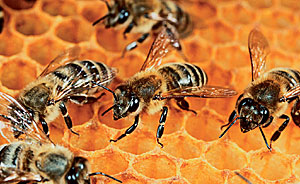sierraclub.org - sierra magazine - july/august 2011 - grapple: none of your beeswax
None of Your Beeswax | Don't Sweat the Small Stuff | "Once You Start Down the Dark Path..." |
As the World Warms | Up to Speed
NONE OF YOUR BEESWAX
The EPA is slow to move on pesticide blamed in honeybee collapse
 Konrad Wothe/Picture Press/Photolibrary
Konrad Wothe/Picture Press/Photolibrary
Since honeybee colonies began collapsing in 2006, the cause has been a mystery. Suspects have included mites, viruses, fungi, malnutrition, genetically modified organisms, and cell phones. Mounting evidence, however, points to the role of a particular class of pesticides. The biggest mystery now is why the EPA refuses to act on those clues.
As far back as 1999, France banned the pesticide imidacloprid after it was implicated in a massive die-off of honeybees there. It's one of a class of pesticides known as "neonicotinoids," synthetic poisons that mimic nicotine's ability to fatally disrupt insects' nervous systems. Instead of coating leaves and stems, the pesticide is applied to seeds so that it infuses every part of a plant, including its nectar and pollen.
Ten years after the French ban, Jeffery Pettis, the leading bee researcher for the U.S. Department of Agriculture, showed that bees fed low levels of imidacloprid in a laboratory were more susceptible to the deadly fungus Nosema ceranae-although he notes that these results have not been duplicated in the field. Germany, Italy, and Slovenia followed France's lead by banning clothianidin, another neonicotinoid pesticide. (Italy's 2009 clothianidin-free corn planting coincided with its first healthy bee season in 10 years.) When Bayer CropScience introduced it into the United States in 2003, the EPA approved it on the condition that Bayer study its chronic effects. Clothianidin became widely used, and, coincidentally, many U.S. bee colonies decreased by 30 to 90 percent.
What about Bayer's follow-up study? The EPA declared it to be "scientifically sound" but declined to disclose it. The study was published only after a 2008 suit by the Natural Resources Defense Council and proved to be woefully inadequate, amounting to a single 2.5-acre test plot. Then, last November, someone at the EPA leaked an internal memo to Colorado beekeeper Tom Theobald that called clothianidin "highly toxic" to honeybees. Asked by several environmental and beekeeping organizations to issue a "stop use" order on the pesticide, the EPA refused.
Steven Bradbury, director of the agency's office of pesticide programs, said that the agency was "not aware of any data that reasonably demonstrates" that bee colonies are at chronic risk from the pesticide-despite his agency's own finding of acute hazard. —David Darlington
Don't Sweat the Small Stuff